
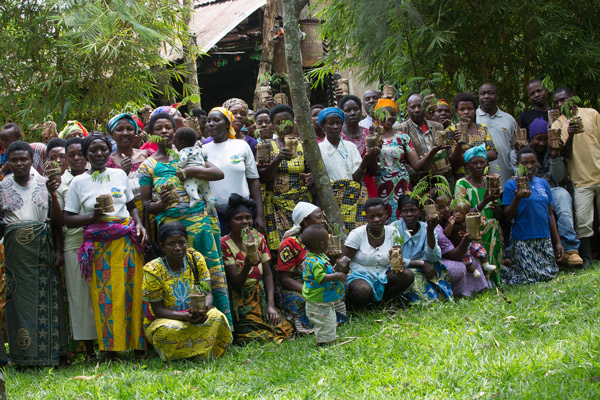
How Rwanda Redrock Tourism project engages visitors and reduce poverty through sustainable education programs?
Tourism can make a difference, and Greg Bakunzi from Redrock Rwanda is showing the Rwanda style approach as an example of leading the way in poverty reduction through education involving tourism and visitors.
The United Nations defined sustainability as “meeting the needs of the present without compromising the ability of future generations to meet their own needs.”
The last decade has seen worldwide effort, led by UNESCO, to promote ESD (education for sustainable development) that ensures social, ecological and economic viability and well-being.
According to an article appearing in Habitat for Humanity website, various global indices including the Social Progress Index and the Human Development Index show that low educational attainment is most widespread in Sub-Saharan Africa, and South Asia. Sub-Saharan African countries often suffer from relatively unstable economies as well as and droughts which further worsen the educational crisis and poverty levels.
In Rwanda, even though the government has strived to make education affordable, still, some children, especially in rural areas are unable to go to school because their families face different challenges like poverty. Therefore, many children do not have scholastic materials to make them effectively learn.
Redrock Initiraive from Rwanda
It is in this regard that private sector players and organizations like Red Rocks Rwanda, through one of its programs called Red Rocks Initiatives for Sustainable Development have stepped in to fill this gap.
Through this program, Red Rocks engage a team of volunteers to teach the local youth and women, who were unable to go to school, and hence are hampered by illiteracy, to teach them mostly English language so that they can effectively communicate with visitors.
Red Rocks Cultural Center, where this initiative is run, is Musanze district, the hub of tourism in Rwanda. Therefore, the main purpose of the program is to teach these youth English skill to enable them interact with tourists.
The women and youth are involved in selling products like handcrafts and it’s through effective communication that they can engage with the tourists who visit local attraction sites. The locals are able to uplift their living standards and help in conservation around our parks.
The locals are helped to learn foreign international languages, housekeeping, capacity building, an international architecture, modern farming techniques and about the environment and its conservation and other skills that may uplift their living standards.
But this is not the end. Another key mission of the program is to invite professionals, teachers, educators and conservationists to educate the locals on conservation, particularly around the national parks.
“We believe that the sustainable education program initiated by Red Rocks as one of its major initiatives is going to eventually lead to community development but also environmental conservation,” says Greg Bakunzi, the founder of Red Rocks Rwanda and the initiator of the program.
He adds that they also hope, through support and volunteerism, to educate kids that come from extremely poor families.
“These children need education just like the rest of us. In this age, education for all should be given priority and everyone with ability should take responsibility to support those kids who are not able to go to school because of different challenges,” says Bakunzi.
The Red Rocks Sustainable Education programs believe that it’s through education that we can break the circle of poverty and hopeless indigence that affect many families in rural area, particularly in Nyakinama village when the center is located.

Data & Digital Platforms: Driving Tourism Growth in Asia Pacific
BANGKOK, September 17, 2018 — Over nine million new jobs can be created within Asia Pacific destinations over the next five years by fully embracing digital platforms and data driven innovation in the tourism sector, according to ‘Data & Digital Platforms: Driving Tourism Growth in Asia Pacific’, a new research report published by PATA and Tourism Economics, an Oxford Economics company, with the support of Google.
“Now more than ever, it is critical that organisations obtain a thorough understanding of current technologies and innovations to make smarter and more informed decisions. This comprehensive report on digital platforms and data driven innovation from our newest Preferred Partner, Oxford Economics, provides important insight into the need for embracing the disruptive and technological changes occurring within the travel and tourism industry,” said PATA CEO Dr. Mario Hardy. “At PATA, we believe that both the public and private sectors must adopt policies to support a thriving digital ecosystem and work in partnership to enhance access to digital products and services and facilitate cross-border data flows.”
With travellers increasingly using online platforms before, during and after their trips, the report highlights several policy recommendations that destinations and policymakers should embrace to support the digital ecosystem and maximise growth opportunities for their stakeholders, including:
Continue to invest in digital infrastructure to improve competitiveness;
Encourage widespread use of digital platforms, and promote data driven innovation;
Ensure skills shortages are addressed;
Address digital use and skills in SMEs to ensure competitiveness in international markets; and
Avoid restrictive policy, such as data localisation policies.
According to the report, the economic benefits are clear for businesses and destinations, as well as for travellers. Over the past five years, arrivals are 5 percent higher than would otherwise be the case due to digital interactions as businesses are better equipped to connect with potential travellers. This impact is higher in destinations which have embraced digital travel interactions.
By adopting the policy recommendations as outlined in the report, there is potential for destinations within the Asia Pacific region to grow GDP by up to one percent, generating over 9 million new jobs over the next five years.
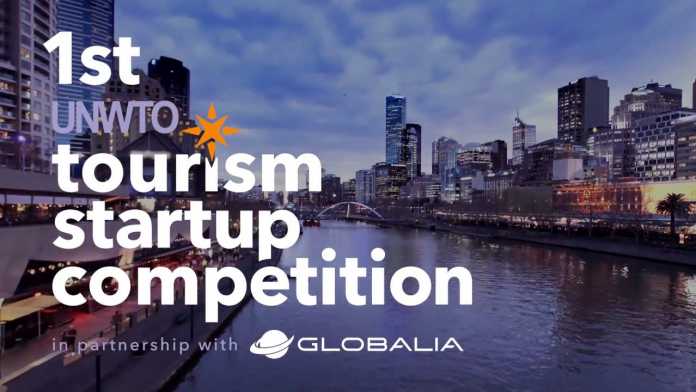
A Global Success: 1st UNWTO Tourism Startup Competition in Collaboration with Globalia
• More than 3000 projects from 132 countries were presented
• It constitutes an initial mapping of entrepreneurial and pioneering talent on disruptive innovation for sustainable tourism businesses
• The 20 semi-finalists will present their projects at the official celebration of World Tourism Day to potential investors and partners
Madrid, Spain, 13 September 2018 – The first edition of the UNWTO Tourism Startup Competition, organized by the World Tourism Organization (UNWTO) in partnership with Globalia, the leading tourism group in Spain and Latin America, is the world’s first and largest initiative devoted to identifying new companies that will lead the transformation of the tourism sector and fostering innovation ecosystems through tourism. The semi-finalists have been invited to present their projects in the framework of the official celebration of World Tourism Day in the presence of global leaders in the sector (27 September 27, Budapest, Hungary). The finalist projects will be presented at the next edition of the International Tourism Fair of Madrid (Fitur), in January 2019.
The competition was focused on the search for innovative startups capable of transforming the way people travel and experience tourism, while adhering closely to the principles of sustainability (economic, social, environmental). The projects addressed areas such as the future of travel (33%), the tourism experience (32%), community development (29%) and environmental impact (6%).
“Today, innovation is one of the main drivers of sustainability, and tourism must continue to be at the vanguard as one of the leading sectors in new business models and relationships between people, and also as a steadfast and successful ally in promoting sustainable development throughout the world,” said UNWTO Secretary-General Zurab Pololikashvili.
Each solution’s uniqueness, viability, potential impact, business model and scalability, along with the profile of the team, were the criteria for selecting the 20 semi-finalists.
“The large number of companies that have presented their innovative proposals and projects reflects a true revolution in the way we travel and enjoy tourism,” said Globalia CEO Javier Hidalgo. “As a global tourism group, we are delighted to lead and spearhead this initiative together with the World Tourism Organization and we want to work together to lead the transformation of the tourism sector and become a benchmark.”
This group is notable for embodying entrepreneurial talent that offers pioneering proposals in the implementation of emerging and disruptive technologies that generate new sustainable business models.
Therefore, among the semi-finalists we find innovative projects that redefine the how trips are planned and how tourism is experienced, projects that promote sustainability and community involvement, as well as projects that use technology to revolutionize business models and the management of companies in the sector.
Those selected for the next stages will gain access to the leading actors in world tourism,
providing visibility and networking opportunities, as well as opening up financing and business development possibilities.
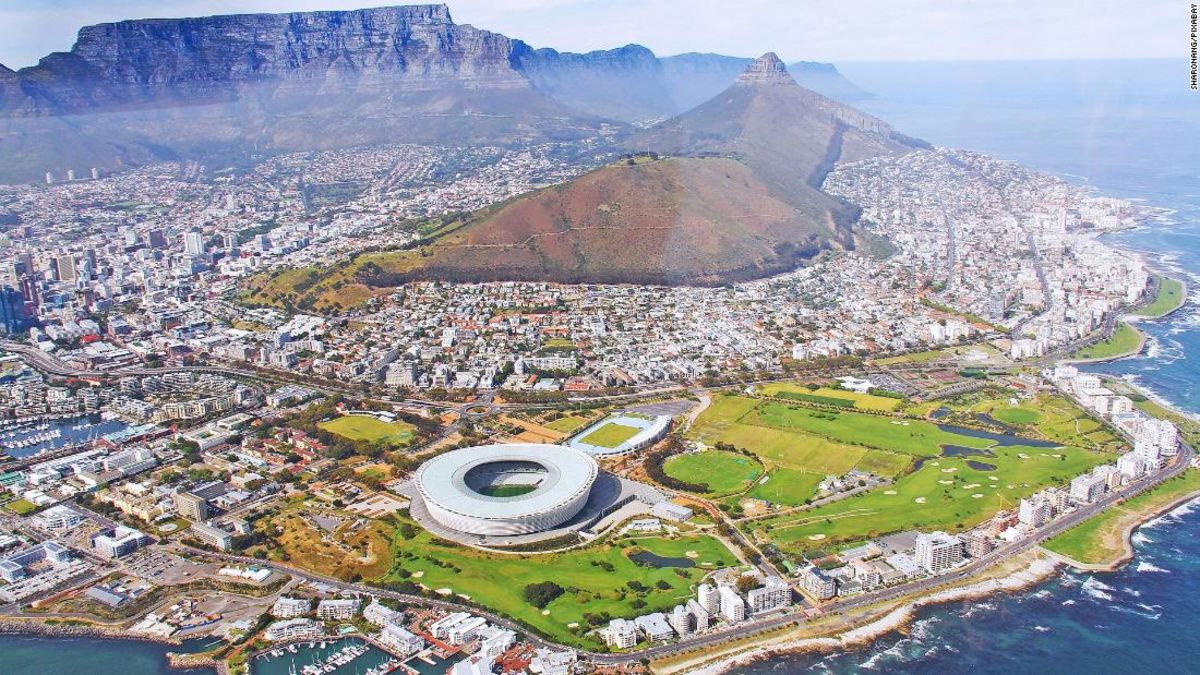
Driving transformation in tourism – the UNWTO call to action
Put yourself in the shoes of the 20th Century traveler; just a couple of years ago, the avid explorer would watch interesting programmes on TV or head to the library to research destinations. Then they’d head to a travel agent and browse brochures before making a booking. That would involve a trip to the bank, too, and then still another trip to the mall to get travel supplies and suitable clothing. All that traveling before even leaving home. Now, it’s possible to do all of that and more from your mobile phone or laptop. The world as we know it is changing, with technology disrupting how we explore the global village.
The African experience emerges
Across Africa, countries are coming online at a faster rate than any other continent on the planet, largely because we have lagged in developing the necessary infrastructure, but this is enabling young entrepreneurs to develop innovative travel solutions suitable to our own context. It’s creating jobs that didn’t exist 25 years ago and is at the very heart of a transformative revolution that spans many nations. Travelers and tourism professionals are, quite literally, holding their future in their hands.
The more African countries come online, and visitors can share their travel experiences via social media channels while traveling, the more we’re opening up to the global travel market. It may have been tricky to find out about certain countries previously, with very little being available even in libraries, but now you can follow a hashtag like #ExploreZambia (for example) and get a vivid explorer’s eye view for the land, to whet your appetite for travel.
The theme for the UNWTO’s World Tourism Day for 2018 is digital transformation in tourism, described by the organisation as “helping to put the opportunities provided to tourism, by technological advances including big data, artificial intelligence and digital platforms, on the map of sustainable development. The World Tourism Organization (UNWTO) sees digital advances and innovation as part of the solution to the challenge of marrying continued growth with a more sustainable and responsible tourism sector.”
Furthermore, UNWTO Secretary-General Zurab Pololikashvili has stated that harnessing innovation and digital advances provides tourism with opportunities to improve inclusiveness, local community empowerment, and efficient resource management, amongst other objectives within the wider sustainable development agenda, and those are critical elements to the development of which we are very much aware in South Africa.
Inclusivity – a call to action
Our innovative approach to addressing water shortages has proven that we’re capable when it comes to doing just that, with initiatives ranging from desalination projects to awareness campaigns that reinforce our activities. New technologies are breaking down barriers to access in business, such as on-the-go payment options like Yoco and Snapscan, widening opportunities for SMEs and making it easier for visitors to pay.
Another means by which we’re tackling transformation is within our neighborhoods, driving inclusivity by showcasing micro-tourism businesses so that the whole world can see what life is like in neighborhoods such as Langa, Gugulethu, and Khayelitsha, for example. This enables us to work with communities to ensure that the benefits of tourism don’t just dwell with larger tourism enterprises, but that SMEs can share in the economic impact.
Our journey to sustainability in tourism cannot be steered by one organisation or government department, it must be a factor that’s central to every business strategy. With increased access to remarkable technological solutions, we have no excuse for ignoring this call to action – the more energy we put into expanding our technological transformation, the more we’ll see entire communities benefiting, from increased economic rewards to job and entrepreneurial opportunities.
Enver Duminy is CEO of Cape Town Tourism and has been asked to share his vision at the UNWTO Summit in Seoul, Korea, in September 2018.
The African Tourism Board is in the process to bring Africa together. With Tony Smith, head of the iFREE Group,a global company pioneering new ways to stay connected in the world of travel and mobile communications joining the African initiative. From international calls and data roaming solutions to Wi-Fi connectivity and unique travel products, the iFREE Group has set a goal to break down barriers and bring the world closer together
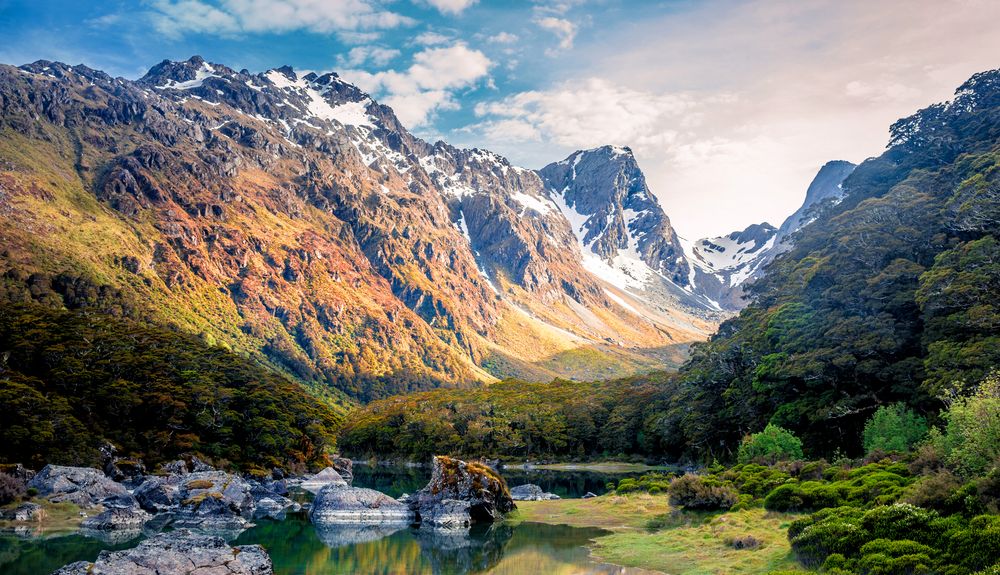
Travel & Tourism generated 18% of New Zealand’s GDP in 2017
Travel & Tourism generated 18% of New Zealand’s GDP in 2017 Research published by the World Travel & Tourism Council has shown that in 2017, the total contribution of Travel & Tourism accounted for 17.9% (NZD$47.5bn) of New Zealand’s GDP. This figure is set to rise by 2.9% per annum and forecast to account for 20% of New Zealand GDP over the next decade.
Other highlights of the report show:
Travel & Tourism supported 212,000 jobs in 2017 (8.8% of total employment). By 2028, over 275,000 of jobs in New Zealand (10.9% of total employment) are forecast to be dependent on Travel & Tourism. The travel sector grew by 3.2% in 2017, faster than the economy as a whole which grew at 2.9% in the total wider economy. New Zealand is the 32nd largest travel economy in the world.
Gloria Guevara, President & CEO, WTTC, said “Travel & Tourism creates jobs, drives economic growth and helps build better societies. New Zealand is a prime example of this, as the country and its natural beauty is expected to attract over 2.7 million international tourist arrivals in 2018 alone. This represents a 3.9% economic increase from 2017 where visitor exports were responsible for generating NZD14.5bn (USD10bn).
Tourism has risen up the agenda in New Zealand over recent years and I commend the government on its support for the sector. Going forward it will be vital for public and private sectors to continue to work together, with the close involvement of communities, to ensure that tourism growth is sustainable, inclusive and benefits everyone.”
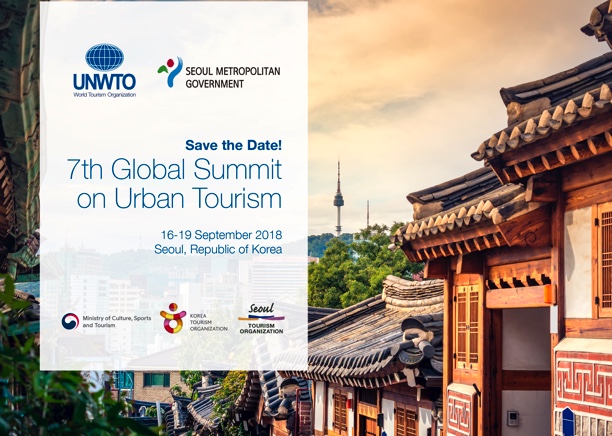
UNWTO: Laying out a Sustainable Future for Urban Tourism
Madrid, Spain, 1 August 2018 – Urban tourism and its potential for more sustainable and inclusive cities will be the major focus of the 7th UNWTO Global Summit on Urban Tourism (16-19 September 2018) in Seoul, Republic of Korea. The Summit aims to set out a vision looking to 2030 for this rapidly-growing tourism segment.
The Summit, the first of its kind in North-East Asia, is designed to encourage new strategic approaches to the challenge of a growing tourism sector and its impact on urban destinations, through sharing of innovative ideas and experiences.
Innovative approaches to competitiveness in urban destinations, technology’s impact on urban tourism, rejuvenation of cities, and increasing inclusion in city development are among the topics to be featured.
BBC support
UNWTO is proud to announce the support of the BBC to the Summit, with the lead presenter of the Travel Show, Rajan Datar, moderating the “High Level Panel: Urban Tourism in 2030” with ministers and mayors from around the world.
This year’s edition will feature B. Joseph Pine II, author of the best-seller ‘The Experience Economy’, who is known for first using the term to describe the major shift in motivation for people to undertake many economic activities, including travel. Other planned speakers include city mayors and representatives of tourism administrations from destinations such as Amsterdam, Barcelona, Cape Town, Osaka, San Sebastian, Singapore and Seoul, companies such as MasterCard, Google and Amadeus, and the World Bank.
The Summit also embraces the growing segment of youth travel through the UNWTO Global Youth Summit on Urban Tourism side-event (18 September).
Seoul as a backdrop
Seoul is a world-class urban tourism destination, with tourism sites ranging from full heritage sites, including traditional palaces or markets, to state-of-the-art architecture and museums. Recent urban regeneration projects have seen an oil depot turned into a culture park and increased tourism interest to venues used for 2018 events the Pyeongchang Winter Olympics and inter-Korean summit.
Seoul as host destination will feature its fair and inclusive tourism initiative in the conference programme, promoting the importance of building inclusive cities for all.
The Summit is jointly organized by the World Tourism Organization (UNWTO) and the Seoul Metropolitan Government with the support of the Ministry of Culture, Sports and Tourism of the Republic of Korea, the Korean Tourism Organisation and the Seoul Tourism Organization.
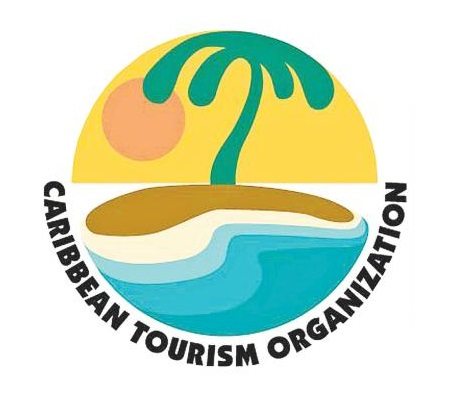
CTO helps Dominica prepare to cope with the impact of climate change
~ A two-day climate sensitisation and disaster risk management workshop was part of a series of training programmes being conducted by the organisation in that member country ~
The Caribbean Tourism Organization (CTO), the region’s tourism development agency, has been working closely with its member country, Dominica, to be better able to plan for, withstand and recover from the negative impacts of climate change and natural disasters.
The CTO has completed a two-day climate sensitisation and disaster risk management workshop in Roseau, aimed at facilitating the sharing of knowledge and best practices on strategies related to climate mitigation and adaptation, as well as identifying sound disaster risk management approaches.
Dominica suffered a direct hit by category five Hurricane Maria last September, which wiped out 226 per cent of its gross domestic product, two years after Tropical Storm Erika passed over the island, destroying an entire village, killing 20 people and leaving behind damage to 90 per cent of the country’s GDP.
“The topics of climate change and disaster preparedness are very pertinent to us in Dominica and in the wider Caribbean. We live in a region that is prone to the effects of climate change and disasters especially hurricanes. Of course, we have first-hand knowledge and recent experience with hurricanes,” Colin Piper, the chief executive officer of Discover Dominica Authority (DDA), the island’s tourist board, said at the opening of the workshop
“Anecdotal data indicates that tourism arrivals after natural disasters reduce by up to 30 per cent for up to three years. We are in fact experiencing a reduction in promotable visitor arrivals. For some properties, their occupancy levels may be up due to aid and agency short stays, but we must address this issue which threatens our livelihood within the hospitality industry and as nation,” he added.
Thirty tourism practitioners and decision makers from the public and private sectors participated in the event, which formed part of the “Supporting a Climate Smart and Sustainable Caribbean Tourism Industry” project currently implemented by the CTO, with funding and technical assistance from the Caribbean Development Bank, through the joint Natural Disaster Risk Management (NDRM) programme for Caribbean Forum states, undertaken in conjunction with the African Caribbean and Pacific Group and the European Union.
The 26-27 July workshop, facilitated by strategic planning expert Dr. Jennifer Edwards, was the latest in a series of training programmes being conducted by the CTO for Dominica.
Earlier this month a “Delivering Quality Service” workshop was held for 55 craft and souvenir vendors, hair braiders and tourism taxi service providers to help them better appreciate the importance of their roles in visitor satisfaction; improve people relations through effective communication and understand how positive visitor interactions result in satisfied visitors.
That workshop, facilitated by the CTO’s regional human resources development consultant Sharon Banfield- Bovell, covered areas such as understanding the customer, the importance of delivering quality customer service and the ten principles of customer service, all areas which Dominica said were critical in ensuring the service providers are equipped with the necessary skill set to deliver the highest level of customer service.
In addition, 25 participants each are to be trained in the management of sites and attractions at a workshop which targets forestry park wardens and the Waitukubuli National Trail Project among others, and a management of service quality workshop for senior executives and general managers in private and public sector tourism enterprises.
The CTO’s resource mobilisation and development division offers several training and development programmes, for member countries and the tourism sector, in keeping with its mandate to assist in developing and strengthening human capital in the region’s tourism sector so as to offer high levels of professional service.
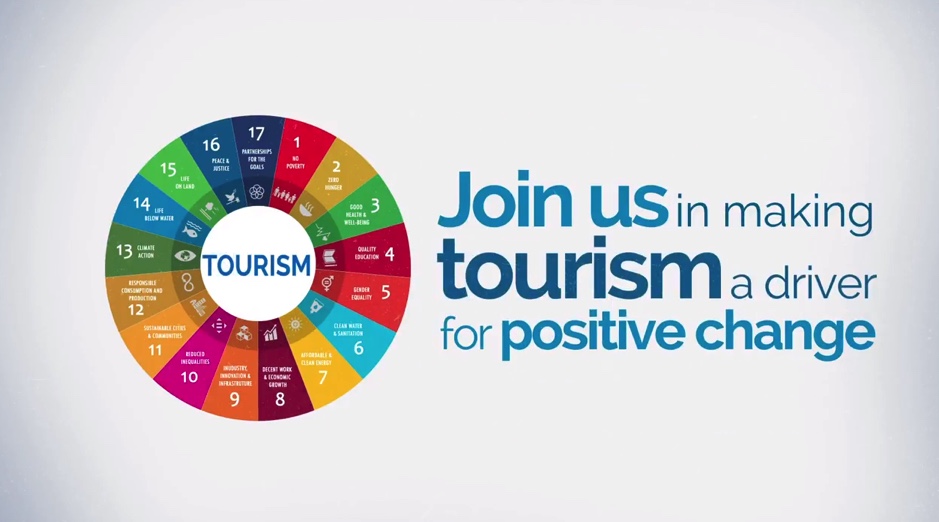
UNWTO launches an online Platform to Achieve SDGs through Tourism
Madrid, Spain, 23 July 2018 – Promoting a greater engagement of the tourism sector with sustainable development is the main objective of the Tourism for SDGs Platform. The online tool is designed to advance the achievement of the Sustainable Development Goals through tourism, and was developed by the World Tourism Organization (UNWTO) with the support of Switzerland’s State Secretariat for Economic Affairs (SECO).
The 17 Sustainable Development Goals (SDGs) constitute an ambitious global agenda for people, planet, prosperity and peace through partnerships. The SDGs aim to end poverty, fight inequality and injustice, and solve climate change by 2030. The economic relevance of tourism, representing up to 10% of the world’s GDP and employment, makes harnessing its full potential essential for the advancement of the SDGs.
Tourism4SDGs.org is a co-creation space that allows users to access a wide range of resources, add their own initiatives, findings and projects, motivate discussion and collaboration, and share content related to tourism and sustainable development.
“Tourism plays a vital role in many, if not all, of the 17 Goals”, said UNWTO Secretary-General Zurab Pololikashvili. “Tourism has come of age as a cross-cutting economic activity with deep social ramifications, and the Tourism for SDGs Platform is providing the global tourism community with a space to co-create and engage to realize the 2030 Agenda for Sustainable Development”, he added.
“Switzerland strongly supports this platform as it will allow a focus on the three main components of sustainable tourism: its economic, environmental and social dimensions,” said Ambassador Raymund Furrer of SECO.
The platform’s three main features act as a call for action. Learn, Share and Act, the three levels of interaction at Tourism4SDGs.org, aim not only to educate but also to encourage conversation and collaboration towards a sustainable tourism sector.
The platform was launched during the United Nations High-Level Political Forum on Sustainable Development ‘Transformation towards sustainable and resilient societies’ (New York, 9-18 July) during an event co-hosted by UNWTO and the One Planet network.
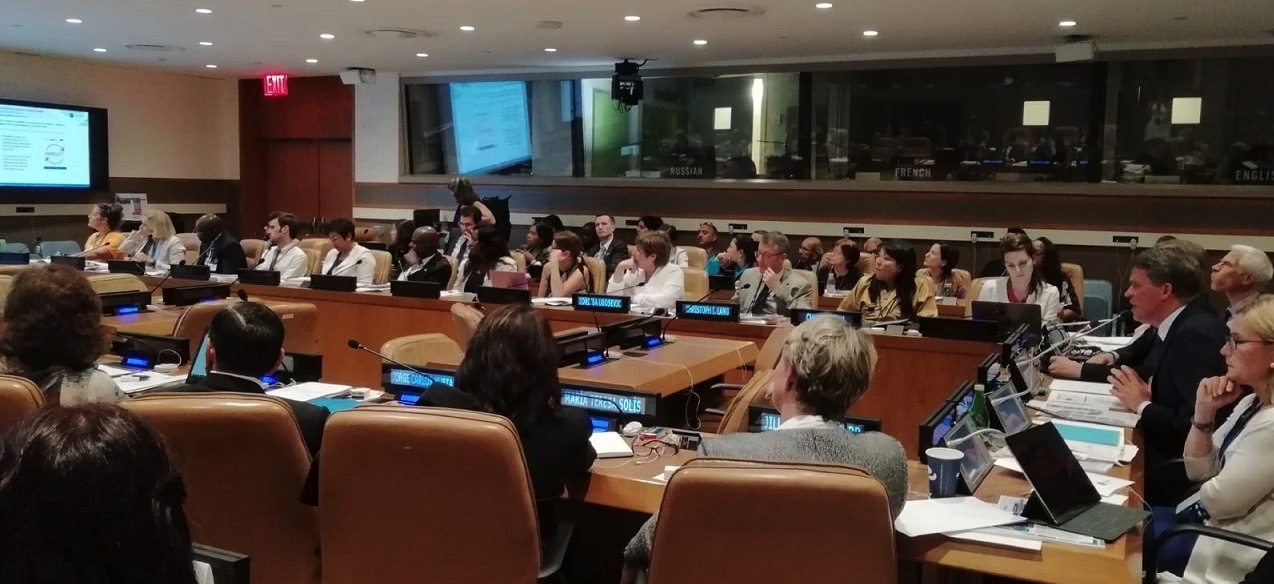
Tourism and Construction have Power to Lead Move to Sustainable Economies
Madrid, Spain, 19 July 2018 – From infrastructure and communication to food production and transport, tourism and construction play key roles in a circular economy framework that supports sustainable development. The World Tourism Organization (UNWTO), together with the Sustainable Buildings and Construction Programme of the One Planet Network, addressed this challenge during the United Nations High-Level Political Forum on Sustainable Development (9-18 July, New York, USA).
Tourism and construction are part of the overall economic value chain. Best practices in circular economy thinking that can help these large economic sectors shift to sustainable consumption and production (SCP) were at the centre of the event ‘Tourism & Construction: Circular Economy solutions for SDG12’, organized by UNWTO.
Advancing sustainability in the tourism sector and fulfilling its responsibility in the achievement of the Sustainable Development Goals (SDGs) is a task that benefits from new technological advances, continuous innovation and the strengthening of models such as the circular economy. Especially in view of SDG12 on ‘sustainable consumption and production patterns’, and considering the need to grow responsibly as a sector overall, tourism has an important role to play in the decoupling of economic development from resource use.
With its vast links to other economic activities and direct interaction between consumer and producer, tourism can – if managed well – create positive, long-lasting impacts that go well beyond the sector. Adapting circular production and consumption patterns that accelerate sustainability is therefore key to the long-term health and resilience of tourism businesses and destinations.
Against both this background and the review of SDG 12 at the High-Level Political Forum, the event ‘Tourism & Construction: Circular Economy solutions for SDG12’ underscored that embracing circularity implies robust measurement and monitoring of impacts of tourism and construction activities, including energy and water use efficiency, climate change mitigation, waste management, local sourcing, sustainable land use, biodiversity protection and decent employment, among others.
The 17 SDGs represent a common vision for prosperity, equality, justice and climate action, brought together under the 2030 Agenda for Sustainable Development. Goal 12 calls for more responsible SCP patterns and practices across sectors, with the One Planet Multi-Partner Trust Fund for SDG 12, inaugurated on 17 July 2018, to support partners’ commitments to accelerating this shift. The Fund is a joint effort of the UN Environment Programme, the Food and Agriculture Organization, UNWTO, UN-Habitat and the UN Office for Project Services.
‘Tourism & Construction: Circular Economy solutions for SDG12’featured panels and presentations from the governments and tourism and development administrations of Bhutan, Botswana, Finland, France, Mexico and Switzerland. The gathering also played host to the launch of UNWTO’s Tourism for SDGs Platform, an interactive online tool that aims to create collaboration, motivate discussion and foster action between the tourism sector and the world of sustainable development. The platform, developed with the support of the Swiss Secretariat for Economic Affairs, is for policy makers, companies and all tourism stakeholders to connect and jointly advance their SDG implementation strategies.
Concluding the event, the Head of Delegation for Sustainable Development from the Ministry for the Ecological and Inclusive Transition of France stressed the need to accelerate the shift towards SCP and encouraged both tourism and construction to build cross-sectorial cooperation. If properly developed and used, circular economy solutions will be instrumental to transforming the sustainability of our economic model.
About the One Planet – Sustainable Tourism Programme
The One Planet Sustainable Tourism Programme is part of the ten-year framework of programmes on sustainable consumption and production, official implementation mechanism of SDG12 aiming at mainstreaming sustainability among tourists and tourism stakeholders worldwide.
Circular economy thinking can enhance this shift because it promotes changes in the consumption and production of goods and services: from buy-use-discard to buy-use-reuse or refurbish, and from traditional ideas of ownership towards sharing economies.
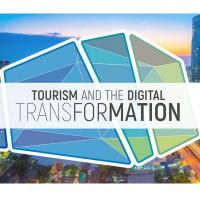
World Tourism Day places focus on innovation and digital transformation
MADRID, SPAIN – The importance of digital technologies in tourism, providing opportunities for innovation and preparing the sector for the future of work, is at the centre of World Tourism Day 2018, to be celebrated in Budapest, Hungary (27 September 2018).
World Tourism Day, celebrated every 27 September around the world, is a unique opportunity to raise awareness on tourism’s actual and potential contribution to sustainable development.
This year’s World Tourism Day (WTD) will help to put the opportunities provided to tourism, by technological advances including big data, artificial intelligence and digital platforms, on the map of sustainable development. The World Tourism Organization (UNWTO) sees digital advances and innovation as part of the solution to the challenge of marrying continued growth with a more sustainable and responsible tourism sector.
“Harnessing innovation and digital advances provides tourism with opportunities to improve inclusiveness, local community empowerment and efficient resource management, amongst other objectives within the wider sustainable development agenda”, said UNWTO Secretary-General Zurab Pololikashvili.
The WTD official celebration will be held in Budapest, Hungary, a country enjoying steady growth of tourism backed by consistent policy support and a commitment to the digital future. Other celebrations will take place worldwide.
The official celebration will also see the announcement of the semi-finalists of the 1st UNWTO Tourism Startup Competition, launched by UNWTO and Globalia to give visibility to startups with innovative ideas capable of revolutionizing the way we travel and enjoy tourism.
